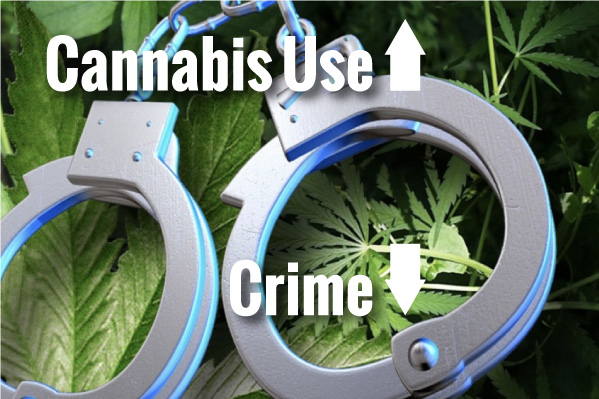One of the reasons offered by prohibitionists for keeping cannabis illegal is that that cannabis leads to crime, by way of some quality inherent to itself. This is a favourite reason trotted out by people whose livelihoods are dependent on government funding for cannabis prohibition, people who are often pigs at the trough in more than one sense. The truth is not only that cannabis is not criminogenic by itself, but that cannabis prohibition is what has caused criminal behaviour to become related to the substance.
One common line of horseshit that people often hear with regard to cannabis use is that it warps people’s brains and makes them impulsive, and thereby criminal. By means of some nebulous kind of brain damage, people who use cannabis lose their ability to control their own inner malice and naturally come to start abusing themselves and other people, both mentally and physically. They come to commit crimes of opportunity when they would normally have resisted the impulse to do so.
Another stupidity is that cannabis addiction leads to stealing to service the cost of the addiction. Confusing cannabis users with the worst kind of crack or heroin user, this stereotype has it that legal cannabis would lead to a large number of people becoming addicted to it and then stealing from other people to get the money to buy more cannabis. Ignoring the fact that finding a dealer who has a proper supply is many times harder than getting enough money to buy the weed in the first place, this idea suggests that prohibition is good because it leads to fewer burglaries and muggings.
The fact is that neither of these glib just-so stories is true.
There is indeed, a link between cannabis and crime, and it comes from the criminal associations that have to be made in order to maintain a cannabis supply. Because cannabis is illegal, the only people that can supply it regularly are professional criminals. So a person who has a need for medicinal cannabis has to deal with professional criminals on account of that they are forbidden by law to deal with a pharmacist.
It is true that, when a person who needs a regular supply of medicinal cannabis comes into contact with a professional criminal, this can lead to crime. What is also true is that this criminogenic effect is a consequence of cannabis prohibition, and has nothing to do with the nature of cannabis itself. The professional criminal might expose the cannabis user to other drugs, or to illegal firearms, or to stolen goods, or even to blackmail. This is a result of the fact that only criminals deal in cannabis when it’s illegal.
Cannabis doesn’t make people stab and rob other people by itself. Going without cannabis, much like going without other psychiatric medicines, mostly just puts people in shitty moods and carries a risk of psychosis. But if you’re the sort of person that does stab and rob people, then its almost a certainty that either you are involved with cannabis or that you move in the same circles as someone who does.
So it’s true that there is an association between cannabis and crime. But this association can be explained by the fact that both are illegal, rather than that involvement with cannabis inherently causes criminal conduct. In places where cannabis is legal, as it (sort of) has been in the Netherlands for some decades now, people who want small amounts of cannabis – even if they want it regularly – can get it without coming into contact with the criminal underworld.
As a result, cannabis does not lead to exposure to harmful criminal activity in places where cannabis is legal at the same rate as it does in places where it is illegal.
Because of all this, we can state that the truth is really close to the opposite of what’s commonly said. A Forbes article from earlier this year showed that crime had fallen in Mexican states that border America, on account of that cannabis law reform had taken the cannabis trade away from the black market. Homicides related to the drug trade were believed to have fallen 41% because of cannabis law reform, as incidents of turf wars over illegal cannabis sales essentially vanished.
These statistics reveal a couple of things. Not only does cannabis not inherently lead to crime, but cannabis prohibition itself inherently leads to crime. Prohibiting cannabis is to move it onto the black market, which is to ensure that organised crime will fight over territory and distribution profits. Once there are large, black market profits to be made in the trade of an illicit substance, ensuing violence is all but guaranteed.
The laws against cannabis prohibition can only be supported if a person understands nothing of the crime wave that followed in the wake of alcohol prohibition. Cannabis prohibition takes all the legitimate demand for the substance – and the demand for it is legitimate, not “drug addiction” – then gifts all of that demand to the black market, who are the only people willing to supply it. This means that it’s prohibition itself that causes the crime that is associated with cannabis, and not the cannabis itself.
Cannabis law reform is necessary so that people who want to engage in the cannabis trade are not exposed to the criminal underworld. This will reduce crime rates by keeping citizens who would otherwise be law-abiding away from the sort of professional criminal who might take advantage of them, or who might bring their criminal influence into other areas of the cannabis user’s life.
*
This article is an excerpt from The Case For Cannabis Law Reform, compiled by Vince McLeod and due for release by VJM Publishing in the summer of 2018/19.

